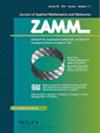Free vibration analysis of FG‐GPL and FG‐CNT hybrid laminated nano composite truncated conical shells using systematic differential quadrature method
IF 3.2
4区 工程技术
Q1 MATHEMATICS, APPLIED
Zamm-zeitschrift Fur Angewandte Mathematik Und Mechanik
Pub Date : 2023-07-06
DOI:10.1002/zamm.202300280
引用次数: 0
Abstract
In the present study, the free vibration of functionally graded graphene platelet‐reinforced (FG‐GPLs) and functionally graded carbon nanotube‐reinforced (FG‐CNTs) hybrid laminated nanocomposite truncated conical shells and panels are analyzed. Multi‐layers truncated conical shell and panel of pure FG‐CNTs, pure FG‐GPLs and hybrid CNTs‐GPLs reinforcement were evaluated. In light of its high accuracy in the calculation of thin and thick shells, a third‐order shear deformation theory is adopted. The governing equations and boundary conditions is derived using Hamilton's principle and is solved numerically using the systematic differential quadrature method (DQM) which uses Kronecker delta function. The effective mechanical properties of the CNT‐reinforced nanocomposite layers are estimated using the rule of mixtures, whereas those of the GPL‐reinforced nanocomposite layers is calculated using the Halpin‐Tsai micromechanical model. Convergence and accuracy evaluation of the presented study are confirmed and a number of parameters, including the CNTS volume fraction, GPLs mass fraction, distribution patterns (i.e., Uniform distribution (UD), Functionally graded O‐distribution (FG‐O), Functionally graded X‐distribution (FG‐X), Functionally graded V‐distribution (FG‐V) and FG‐A), different boundary conditions and the vertex angle of the cone, are investigated. The results obtained in this article for the combination of two different materials, GPLs and CNTs, showed that in controlling the natural frequency of the system, without changing the percentage of fiber and only by changing the arrangement, very wonderful results can be achieved.FG - GPL和FG - CNT杂化层状纳米复合材料截尖锥形壳的自由振动分析
本文章由计算机程序翻译,如有差异,请以英文原文为准。
求助全文
约1分钟内获得全文
求助全文
来源期刊
CiteScore
3.30
自引率
8.70%
发文量
199
审稿时长
3.0 months
期刊介绍:
ZAMM is one of the oldest journals in the field of applied mathematics and mechanics and is read by scientists all over the world. The aim and scope of ZAMM is the publication of new results and review articles and information on applied mathematics (mainly numerical mathematics and various applications of analysis, in particular numerical aspects of differential and integral equations), on the entire field of theoretical and applied mechanics (solid mechanics, fluid mechanics, thermodynamics). ZAMM is also open to essential contributions on mathematics in industrial applications.

 求助内容:
求助内容: 应助结果提醒方式:
应助结果提醒方式:


